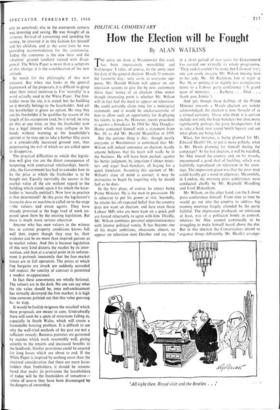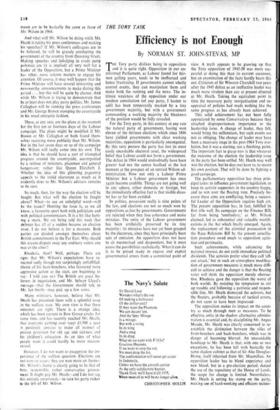POLITICAL COMMENTARY
How the Election will be Fought
By ALAN WATKINS
THE unity on show at Westminster this week has been impressively monolithic and Stalinesque. I refer, of course, to the unity over the date of the general election. March 31 remains the favourite day : very soon, so everyone sup- poses, Mr. Harold Wilson will appear on our television screens to give the by now customary thirty days' notice of an election. (One minor though interesting point is whether Mr. Wilson will in fact feel the need to appear on television. He could certainly claim time for a ministerial statement; and it would be uncharacteristic of him to allow such an opportunity for displaying his talents to pass by. However, recent precedent is against a broadcast. In 1964 Sir Alec Douglas- Home contented himself with a statement from No. 10, as did Mr. Harold Macmillan in 1959.
But the curious thing is this: though nearly everyone at Westminster is convinced that Mr. Wilson will indeed announce an election, hardly anyone believes that his heart will really be in the business. He will have been pushed, against his better judgment, by impatient Cabinet minis- ters and eager back-benchers, all baying for a quick knockout. Assuming this account of Mr. Wilson's state of mind is correct, it may be instructive to begin by inquiring why he should feel as he does.
In the first place, of course, he enjoys being Prime Minister. He is the man in possession. He is reluctant to put his power at risk. Secondly, he retains his oft-repeated belief that the country does not want an election; and here even those Labour MPs who are most keen on a quick poll are forced reluctantly to agree with him. Thirdly, Mr. Wilson combines personal unpretentiousness with intense political vanity. It has become one of his major ambitions, obsessions almost, to appear on television next October and say that in a short period of two years his Government has carried out virtually its whole programme. 'They said it couldn't he done, but I showed 'em'; one can easily imagine Mr. Wilson musing thus to his aide, Mr. Alf Richman, late at night at No. 10, or putting it in slightly less vainglorious terms to a Labour party conference. ('A grand team of ministers . . . Barbara . . . Dick . . . thank you, Jennie.)
And yet, though these feelings of the Prime Minister towards a March election are widely acknowledged, the election is now thought of as a virtual certainty. Those who think it is certain include not only the back-benchers but also, more significantly perhaps, the party headquarters: Let us take a brisk turn round Smith Square and see what plans are being laid.
What, for instance, is being planned for Mr. Edward Heath? Or, to put it more politely, what is Mr. Heath planning for himself during the campaign? At the last election, it will be recalled, Sir Alec toured the country and, on his travels, encountered a good deal of heckling, which was faithfully reproduced on television in the even- ings. The impression given was that the poor man could hardly get a word in edgeways. Meanwhile, in London, the morning press conferences were conducted chiefly by Mr. Reginald Maudling and Lord Blakenham.
Mr. Wilson, on the other hand, ran the Labour press conferences himself. From time to time he would go out into the country to address big evening meetings largely attended by the party faithful. The impression produced, on television at least, was of a politician firmly in control; whereas Sir Alec seemed continually to be struggling to make himself heard above the din. But in this election the Conservatives intend to • organise things differently. Mr. Heath's arrange-
`All right then, Royal visit and the Beatles . .
ments are to be basically the same as those cf Mr. Wilson in 1964.
And what will Mr. Wilson be doing while Mr. Heath is taking his press conferences and making his speeches? If Mr. Wilson's' colleagues are to be believed, he will be gravely conducting the government of the country from Downing Street. Making speeches and indulging in crude party polemics are (it is implied) all very well for a leader of the Opposition, but a Prime Minister has other, more solemn matters to engage his attention. Of course, it may well happen that the Prime Minister will have several interesting and newsworthy announcements to make during this period . . . but this will be quite by chance. And while Mr. Wilson is trying to demonstrate that he at least does not play party politics, Mr. James Callaghan will be running the press conferences and Mr. George Brown stomping the countryside in his usual energetic fashion.
These, at any rate, are the plans at the moment for the first ten or fourteen days of the Labour campaign. The plans might be modified if Mr. Brown or Mr. Callaghan or both found them- selves receiving more publicity than Mr. Wilson. But in the last seven days or so of the campaign Mr. Wilson will really come into his own. The idea is that he should have a sort of triumphal progress around the countryside, accompanied by a retinue of ministers, placemen and general bangers-on; rather like Queen Elizabeth I. Whether the idea of this glittering pageantry appeals to the stolid electorate as much as it evidently does to Mr. Wilson's advisers remains to be seen.
So much, then, for the way the election will be fought. But what will the election be fought about? What—to use an unhelpful word—will be the issues? Hunting the issue is, as we all know, a favourite sport both with politicians and with political commentators. It is a bit like hunt- ing a snark. We are being told this week that defence has all of a sudden become an election issue. I do not believe it for a moment. Both parties are divided amongst themselves about British commitments in the Far East. Why should this arcane dispute sway any ordinary voters one way or the other?
Rhodesia, then? Well, perhaps. There are signs that Mr. Wilson's expectations have re- mained sadly though not surprisingly unfulfilled. (Some of his back-benchers, who favoured more aggressive action at the start, are beginning to say : I told you so.) The British are great be- lievers in negotiation, and Mr. Selwyn Lloyd's message—that the Government should talk to Mr. Ian Smith—may pick up a few votes.
Many ministers, however, believe that Mr. Heath has presented them with a splendid issue in the welfare state. My own view is that these ministers are right. There is a strange idea, which has been current in Bow Group circles for some time, and has recently reached Mr. Heath, that every one earning over (say) £1,500 a year is positively anxious to make all manner of private provision for old age and sickness and his children's education. As an idea of what people want it could hardly be more miscon- ceived.
However. i do not want to exaggerate the im- portance of the welfare question. Elections are not won on issues; they are won more on themes. Mr. Wilson's theme is clearly going to be that of firm, responsible, rather conservative govern- ment. It might pay Mr. Heath—and I do not say this entirely unseriously—to take his party rather to the left of Mr. Wilson.



































 Previous page
Previous page